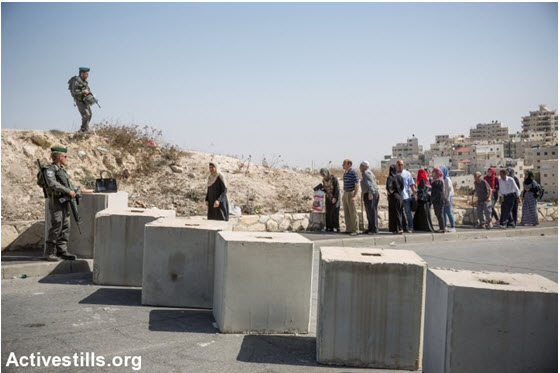According to the Association for Civil Rights in Israel (ACRI), the decision of Israeli authorities to deploy dozens of roadblocks and inspection checkpoints around occupied East Jerusalem, constitutes unlawful, collective punishment for 350,000 male and female residents of East Jerusalem who make up approximately 40% of the city’s population.

Israeli occupation forces stop Palestinians at an army roadblock in the East Jerusalem neighborhood of Al Issawiya, on October 15, 2015. Israel set up checkpoints in the Palestinian neighborhoods of East Jerusalem and mobilized hundreds of soldiers to man them after recent attacks by Palestinians. Their continued presence violates the human rights of the Palestinian residents of East Jerusalem and is suspected to be intentionally motivated as a form of collective punishment. (Photo: Activestills)
Two weeks have passed since the partial closure was announced and the heavy burden on residents is continuing. A few roadblocks have been removed, but others remain in place and continue to prevent vehicles from passing major intersections. Checkpoint personnel are still carrying out inspections. This has resulted in massive traffic jams, disruptions to public transportation, with travel times extended by at least one hour, and delayed arrival times for emergency vehicles. In several neighborhoods, people have to walk to the roadblocks and then board buses waiting on the other side. In Issawiya, thousands of students who attend schools outside their neighborhood are forced to make their own way to the checkpoints and then wait to be individually checked. Roadblocks are seriously disrupting access to hospitals, for both patients and staff.
Extensive delays, interrogations and searches conducted at checkpoints by police without reasonable suspicion are unacceptable and degrading acts that treat all residents of East Jerusalem as suspected terrorists. These collective actions, enforced without individual consideration or suspicion, directly infringe upon the human rights of the residents of East Jerusalem, including their freedom of movement, dignity and right to privacy. Suspicion that the partial closure is purposely intended to impose collective pressure on residents was reinforced by the comments of Yizhar Peled, commander of the Border Police in Jerusalem. Referring to the roadblocks in an article published in Yediot Ahronot on October 10, 2015, Peled said: “These pressure points are activated to stop the attacks … so that residents will condemn and oppose these acts.” Placing roadblocks to exert pressure on the public amounts to collective punishment prohibited by international law and is therefore illegitimate and illegal.
The ACRI has commented that “the law permits police to place temporary barriers following a specific event or danger. However, the police have no authority to surround entire neighborhoods indefinitely; and certainly not with the intention of activating pressure or punishing residents collectively. Even the power that police possesses to detain a person require one of the detaining authorities to display identification before performing searches, and are strictly limited to cases where a specific person is suspected of an actual, concrete offence.”


